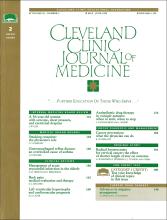Table of Contents
Internal Medicine Board Review
- A 56-year-old woman with syncope, chest pressure, and exertional dyspnea
A self-test featuring a challenging clinical presentation.
Medical Grand Rounds
- Smoking cessation: the physician's role
Patients who come to see a physician are concerned about their health and are receptive to advice. Physicians need to remind patients who smoke of the many dangers of smoking, and encourage those who decide to stop through the long, difficult process of quitting.
- Gastroesophageal reflux disease: an overlooked cause of asthma
Osler noted this association a century ago. Chronic hoarseness, cough, globus sensation, laryngeal cancer, and dental erosions are other conditions GERD can cause.
Current Drug Therapy
- Advances in migraine management
New drugs and a better understanding of migraine's pathogenesis are improving the outlook for patients with this debilitating disorder.
Clinical Reviews
- Management of acute myocardial infarction in the elderly
Because elderly patients are at greater cardiac risk than younger patients, they have more to gain from treatment. Risk-benefit analysis plays a pivotal role in treatment decision-making, since treatments may pose more risk for older patients.
- Back pain: medical evaluation and therapy
Most patients with acute low back pain or sciatica improve with conservative therapy, and most require no immediate diagnostic studies beyond a careful history and exam.
- Left ventricular hypertrophy and cardiovascular prognosis
LVH is an important independent predictor of cardiovascular risk, but the therapeutic implications remain to be explored.
- Antiepileptic drug therapy in younger patients: when to start, when to stop
Recent studies suggest that antiepileptic drug therapy can be discontinued in many young patients after a 2-year seizure-free interval.
Cancer Diagnosis and Management
- Cancer prevention: what the physician can do
The ability to improve the control of cancer today depends more on primary care screening and prevention than on curative interventions at the subspecialty level.
Original Study
- Radical hysterectomy for cervical cancer: the effect of shorter length of stay on outcome
Radical hysterectomy and pelvic lymph-node dissection continue to be a safe and effective treatment for limited cervical carcinoma.



